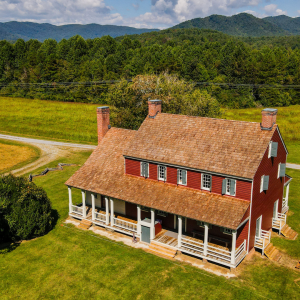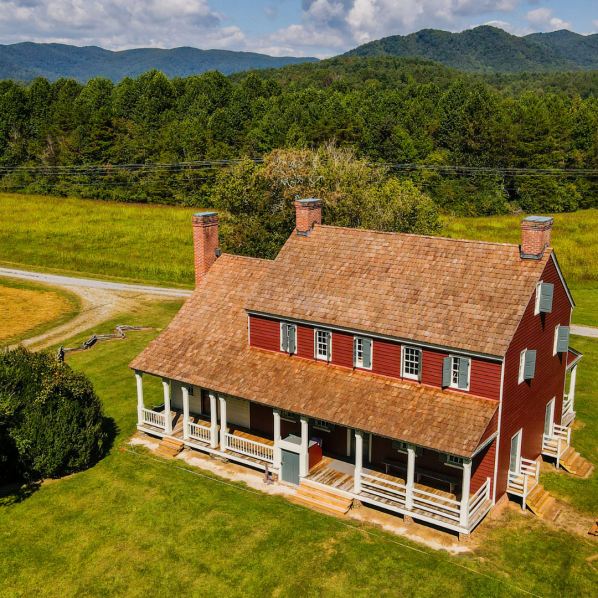LENOIR, N.C. — Students and faculty members from Appalachian State University's College of Arts and Sciences and Reich College of Education collaborated to create an exhibit at Caldwell County's Fort Defiance, a non-profit historical site located at 1792 Fort Defiance Drive in Lenoir. Built in 1792, Fort Defiance is the former home of Colonel William Lenoir.
The exhibit originated from "Antebellum Slavery in Appalachia," a course offered by the Department of Interdisciplinary Studies to address the myth that the Appalachian region had little to no slavery. The course was taught by adjunct instructor and Reich College of Education alumna Dr. Leslie McKesson ’93 ’09 ’16, a descendant of three generations of former slaves of Fort Defiance.
Dr. McKesson's Spring 2023 Honors College Seminar "Antebellum Slavery in Appalachia" course focused on the McDowell Plantation in Morganton. In October, an exhibit entitled “Shadows of a Time Gone By,” in partnership with the Historic Burke Foundation, Inc., showcased the students’ work at the Burke County Courthouse. For the collection, the students received the North Carolina Society of Historians’ Award of Excellence and McKesson won both the Educator of the Year Award and the President’s Award.
This spring, the focus of the course was to interpret the lives of the enslaved that labored at Fort Defiance. The following students—along with Appalachian State faculty members McKesson, Dr. Ellen Cowan and Dr. Beth Davison—collaborated with Fort Defiance's director and board to create an exhibit for tourists of the site.
Archie Adams, junior history major from Greensboro
Suzanne Moreland, junior interdisciplinary studies major from Boone
Cammron Morrison, senior history major from Granite Falls
Dr. Cowan, professor in the Department of Geological and Environmental Sciences (GES), and GES students Cait Kinnamon, Caitlin McCarthy and Tucker Terrell have used geophysical methods to locate the site of the original Fort Defiance. They presented this research at the Geological Society of America Section Meeting in Asheville from April 15-16, 2024. They plan to continue scanning the site's grounds to determine the locations of the original fort, slave cabins and the unmarked graveyard of the enslaved.
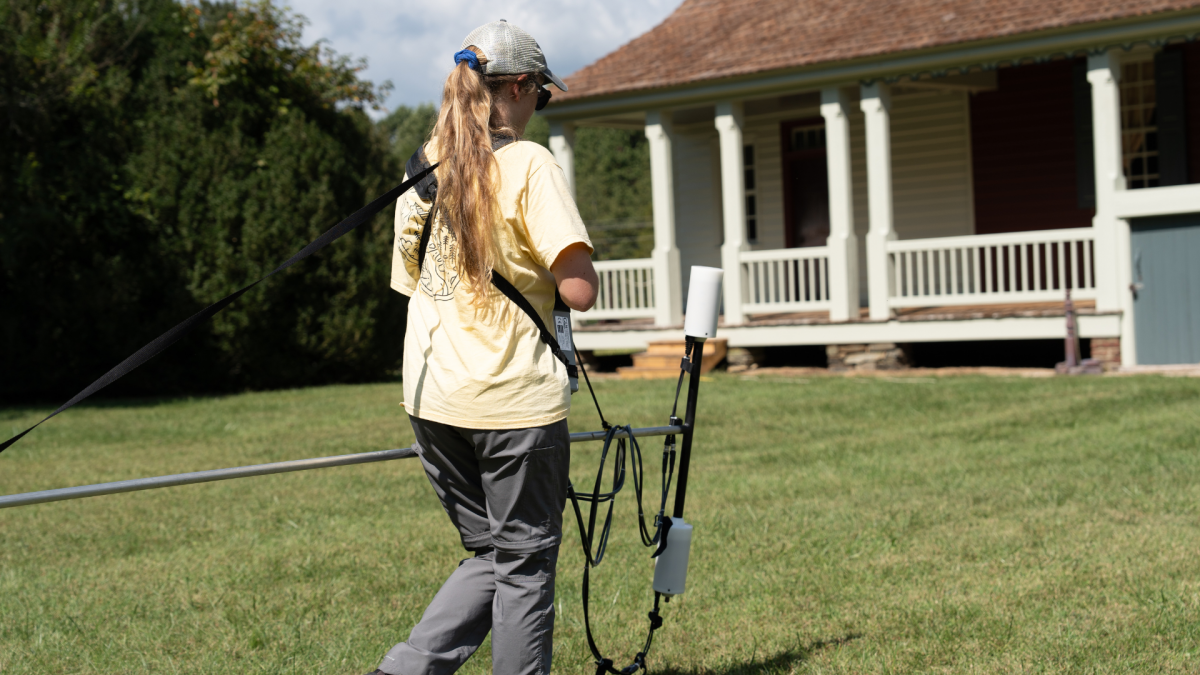
Cait Kinnamon collecting magnetic data in the yard behind the house at Fort Defiance. Photo by Dr. Beth Davison
Dr. Davison, professor in the Department of Interdisciplinary Studies and director of AppDocs, examined the U.S. Slave Schedule statistics for Caldwell County in 1850 and 1860. She is exploring the use of emerging artificial intelligence technology to further understand the over 40,000 pages of documents that make up the Lenoir papers in the archives at the University of North Carolina Chapel Hill and Appalachian State. She is working with the Fort Defiance board to create a tourist video on the history of the location.
On April 29, the group showcased the new exhibit at the Fort that will be available to future visitors to the historical site. The group explained their findings and methodologies in creating the new exhibit.
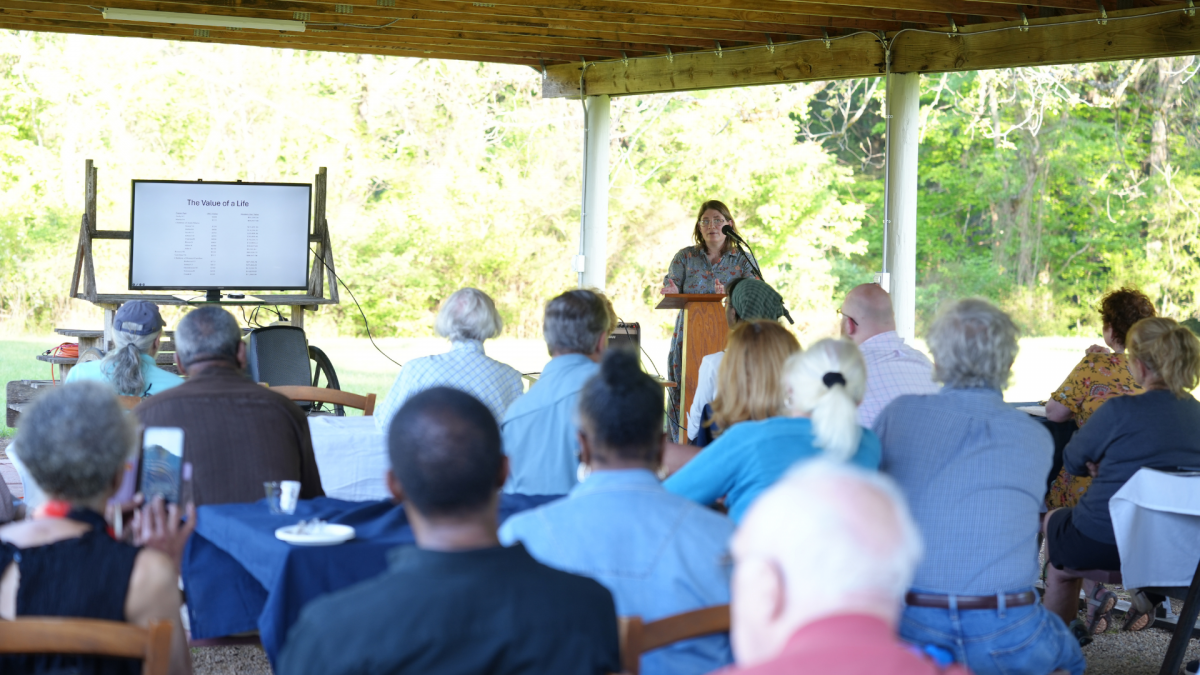
Suzanne Moreland presents at the April 29 event at Fort Defiance. Photo by Jessie Barber
Davison shared that the work at the historic site will continue after the semester ends. She is raising funds to support a large-scale painting in the dedicated exhibit space to reflect the lives of the enslaved at Fort Defiance, and is also considering raising funds for an outdoor sculpture memorial to honor the lives of enslaved people who lived and labored in Caldwell County.
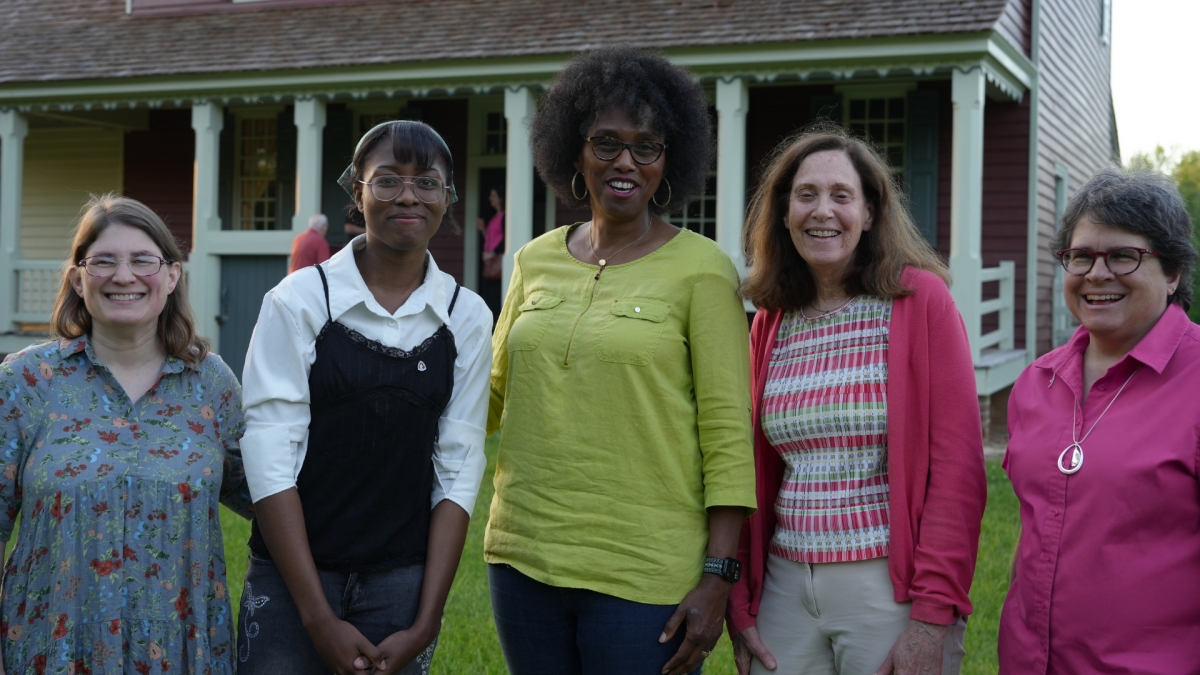
Suzanne Moreland, Archie Adams, Dr. Leslie McKesson, Dr. Ellen Cowan and Dr. Beth Davison at the April 29 event at Fort Defiance. Photo by Jessie Barber
###
About the Department of Geological and Environmental Sciences
Located in Western North Carolina, Appalachian State University provides the perfect setting to study geological and environmental sciences. The Department of Geological and Environmental Sciences provides students with a solid foundation on which to prepare for graduate school or build successful careers as scientists, consultants and secondary education teachers. The department offers six degree options in geology and two degree options in environmental science. Learn more at https://earth.appstate.edu.
About the Department of History
The Department of History offers a broad curriculum in local, national, regional and world history at both the undergraduate and graduate levels, which encourages history majors to develop a comprehensive approach to human problems. The study of history is an essential part of a liberal arts education and offers valuable preparation for many careers, such as law, journalism, public history, public service and business, as well as in teaching and the advanced discipline of history. Learn more at https://history.appstate.edu.
About the Department of Interdisciplinary Studies
The Department of Interdisciplinary Studies offers graduate and undergraduate degrees in four program areas: Appalachian studies; gender, women’s and sexuality studies; global studies; and interdisciplinary studies. The department is also home to Watauga Residential College, an interdisciplinary, alternative general education program. The department promotes creative and imaginative engagement through a cross-disciplinary investigation of complex systems and problems. Learn more at https://interdisciplinary.appstate.edu.
Written by Dr. Beth Davison, Dr. Leslie McKesson and Lauren Gibbs
May 1, 2024
BOONE, N.C.
